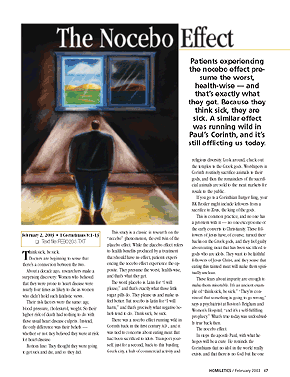
The Nocebo Effect
| 1 Corinthians 8:1-13
It’s no news to report that many people, when given a placebo pill, respond positively because they believe they’re being treated appropriately for their illness and that, of course, they’ll now get better. And they do. Research now shows, however, that those who think they’re sick when they’re not, can often become sick. This is precisely the type of negativity Paul faces with the church at Corinth.
Think sick, be sick.
Doctors are beginning to sense that there’s a connection between the two.
About a decade ago, researchers made a surprising discovery: Women who believed that they were prone to heart disease were nearly four times as likely to die as women who didn’t hold such fatalistic views.
Their risk factors were the same: age, blood pressure, cholesterol, weight. So their higher risk of death had nothing to do with these usual heart disease culprits. Instead, the only difference was their beliefs - whether or not they believed they were at risk for heart disease.
Bottom line: They thought they were going to get sick and die, and so they did.
This study is a classic in research on the “nocebo” phenomenon, the evil twin of the placebo effect. While the placebo effect refers to health benefits produced by a treatment that should have no effect, patients experiencing the nocebo effect experience the opposite. They presume the worst, health-wise, and that’s what they get.
The...
Start today. Cancel any time.
Act now and, for just $7.99 a month or $69.95 a year, you’ll receive a full year of this valuable sermon preparation resource.
Our convenient, continuous-subscription program ensures you'll never miss out on the inspiration you need, when you need it.
You’re never obligated to continue. Naturally, you may cancel at any time for any reason, no questions asked.